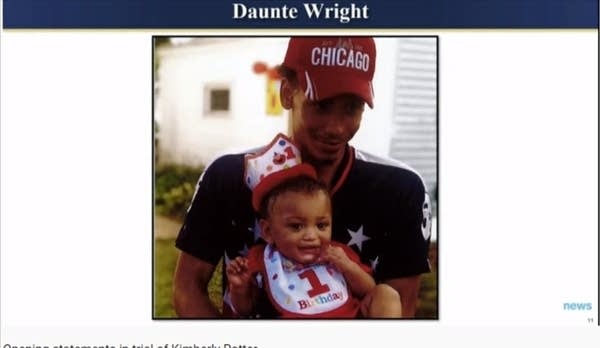Kimberly Potter trial: Emotions high as video of Wright killing plays in court

Go Deeper.
Create an account or log in to save stories.
Like this?
Thanks for liking this story! We have added it to a list of your favorite stories.
3 things to know:
Ex-Brooklyn Center officer Kimberly Potter faces first- and second-degree manslaughter charges
Jurors watch videos of Daunte Wright shooting and aftermath; Wright’s mother and Brooklyn Center cop on the scene testified Wednesday
Potter expected to testify in her defense
Updated 6 p.m.
Prosecutors and defense attorneys on Wednesday began laying out their cases in the manslaughter trial of Kimberly Potter, the former Brooklyn Center police officer in the killing of Daunte Wright.
Opening statements and early witnesses brought intensity and drama to the Hennepin County courtroom where jurors saw police body camera and car dash camera video of the April 11 traffic stop, including Potter shooting Wright, the chaotic aftermath and his mother’s emotional arrival at the scene.
Prosecutors argued Potter acted recklessly in firing her service weapon in disregard of her training and duty.
“There is no do-over when you walk the streets with a loaded firearm, when you’re entrusted with a deadly weapon as part of your job,” prosecutor Erin Eldridge told jurors. “There’s no do-over when you take a young man’s life.”
Turn Up Your Support
MPR News helps you turn down the noise and build shared understanding. Turn up your support for this public resource and keep trusted journalism accessible to all.

Potter, she added, had received extensive training over her 26-year police career, including Taser training about a month before the April 11 traffic stop involving Wright. “She was trained not to use unnecessary force. She was trained not to shoot an unarmed driver. She was trained not to use her Taser on a fleeing suspect.”

Eldridge said Potter had her service weapon pointed at Wright for 5.5 seconds before pulling the trigger.
Defense attorneys argued that Potter meant to fire her Taser to subdue Wright, 20, but accidentally drew her service weapon and shot the man once in the chest, killing him.
“She made a mistake. This was an accident. She’s a human being,” Potter attorney Paul Engh told jurors.
Potter, he said, acted at that moment out of a belief that her fellow officer, who had entered the car through the passenger side to try and grab the car’s gear shift, was in imminent danger of being hurt or killed if Wright was allowed to drive away.

“All he had to do was surrender,” Engh said of Wright.
Potter has pleaded not guilty and is expected to testify in her defense during the trial.
‘Praying that it wasn’t him’
Wednesday’s proceedings included sometimes emotional testimony from Wright’s mother, Katie Bryant, who tearfully recalled that Wright was on his way to get his car washed when he was pulled over by police.
She said Wright called her and sounded nervous. Bryant said she heard what sounded like a confrontation between the officers and Wright before the phone cut out. Bryant called back and spoke to Wright's girlfriend who was in the car with him at the time.
"And she was screaming. And I was like 'what's wrong?' And she said, 'they shot him.'"
Prosecutors played police body camera video of a distraught Bryant arriving at the seen, pleading for information.
“I was praying it wasn’t him lying on the ground,” she told the jurors. She said she quickly recognized his tennis shoes exposed from under the sheet that covered him as he lay on the ground.
“I wanted to comfort my baby, I wanted to hold him and that I wanted to protect him because that’s what mothers do,” she said.
Under questioning from Potter’s defense, Bryant acknowledged Wright did not have a valid driver’s license. She said she was unaware there was a warrant out for her son at the time of the traffic stop.
Brooklyn Center Officer Anthony Luckey was the second witness called by the prosecution. Potter was serving as his training officer when Luckey decided to pull Wright’s car over.
Under prosecution questioning, Luckey said Wright’s behavior was respectful and cooperative during the initial stop.
Prosecutors also introduced body camera footage that hadn’t been previously seen, including one in which Luckey admitted he was hit in the face by a bullet casing after Potter fired her gun.
Under questioning from Engh, Potter’s attorney, Luckey saidt he had felt Wright “tense up” while trying to handcuff him, and that he also may have used a Taser on Wright in the same situation. Luckey also admitted that he and a colleague may have been in danger if Wright had been allowed to flee
‘Taser! Taser! Taser!’
Potter, 49, faces first-degree and second-degree manslaughter charges in the killing of Wright as she and other Brooklyn Center officers, including one she was training, attempted to take Wright into custody during an April 11 traffic stop.
They’d pulled him over for an air freshener hanging from his car's rear view mirror and for expired license plate tabs. When they found he had an outstanding warrant for failure to appear on a gross misdemeanor weapons violation, they began to arrest him.
Wright jumped back into the driver’s seat as officers tried to detain him. On police camera video, Potter can be heard telling Wright “I’ll tase ya” while holding her 9 mm handgun in her right hand and pointing it at Wright.
Potter repeats “I’ll tase you,” and then two seconds later said “Taser, Taser, Taser.” One second later, she fired a single bullet into Wright’s chest; he drove off but crashed shortly after.
“(Expletive) ! I grabbed the wrong (expletive) gun,” Potter is heard saying. “I’m going to go to prison.”
Wright’s killing set off days of protests and property destruction in the Twin Cities suburb, with demonstrators saying Wright’s killing was an example of racial bias by police against Black people.
The most serious charge against Potter requires prosecutors to prove recklessness. The second-degree manslaughter charge alleges that Potter acted with culpable negligence when she fired into Wright’s vehicle.
The prosecution is not characterizing Wright's killing as racially motivated. But civil rights advocates have pointed to a long history of officers not being held accountable when they kill unarmed Black people. Potter is white. Wright was Black.
A jury of 14 people, including two white alternates, will hear the case. Nine of the 12 jurors likely to deliberate are white, one is Black and two are Asian.
Prosecutors, defense wrangle over what jurors will see
Before the jury entered Wednesday morning, prosecutors and defense attorneys met with Judge Regina Chu on potentially controversial pieces of evidence that the jury might be allowed to see during the trial.
That included specific autopsy photos and allegations that Wright told his girlfriend, the passenger in the vehicle that day, to hide Xanax tablets during the traffic stop that he did not want police to discover.
Potter’s defense wanted that information introduced as evidence. Prosecutors argued that court that the Xanax allegation was intended to impugn Wright’s character.
Chu declined to add it as evidence, saying it wouldn’t be admissible unless Potter was aware of it at the time of the incident.
“The key issue in this case was Ms. Potter’s state of mind when this happened,” she said of the shooting. The Xanax allegations have “nothing to do with that issue … and would only serve to mislead or confuse the jury.”
The Associated Press contributed to this report.
Trial basics
Who are the jurors for trial of Kimberly Potter?: The jurors who will hear testimony in former Brooklyn Center police officer Kimberly Potter's trial in the death of Daunte Wright are a mostly white group, with two people who identify as Asian and one as Black. Here’s what we know about the jury.
8 key questions, answered: Kimberly Potter shot Daunte Wright during a traffic stop in April. His killing set off days of protests and unrest in Brooklyn Center, with demonstrators saying Wright’s killing was an example of racial bias by police against Black people.
The charges: The former officer is charged with first- and second-degree manslaughter. Here’s a look at what the charges mean and the potential penalties. Minnesota’s sentencing guidelines call for a prison term of just over seven years on the first-degree manslaughter count and four years on the second-degree one.


